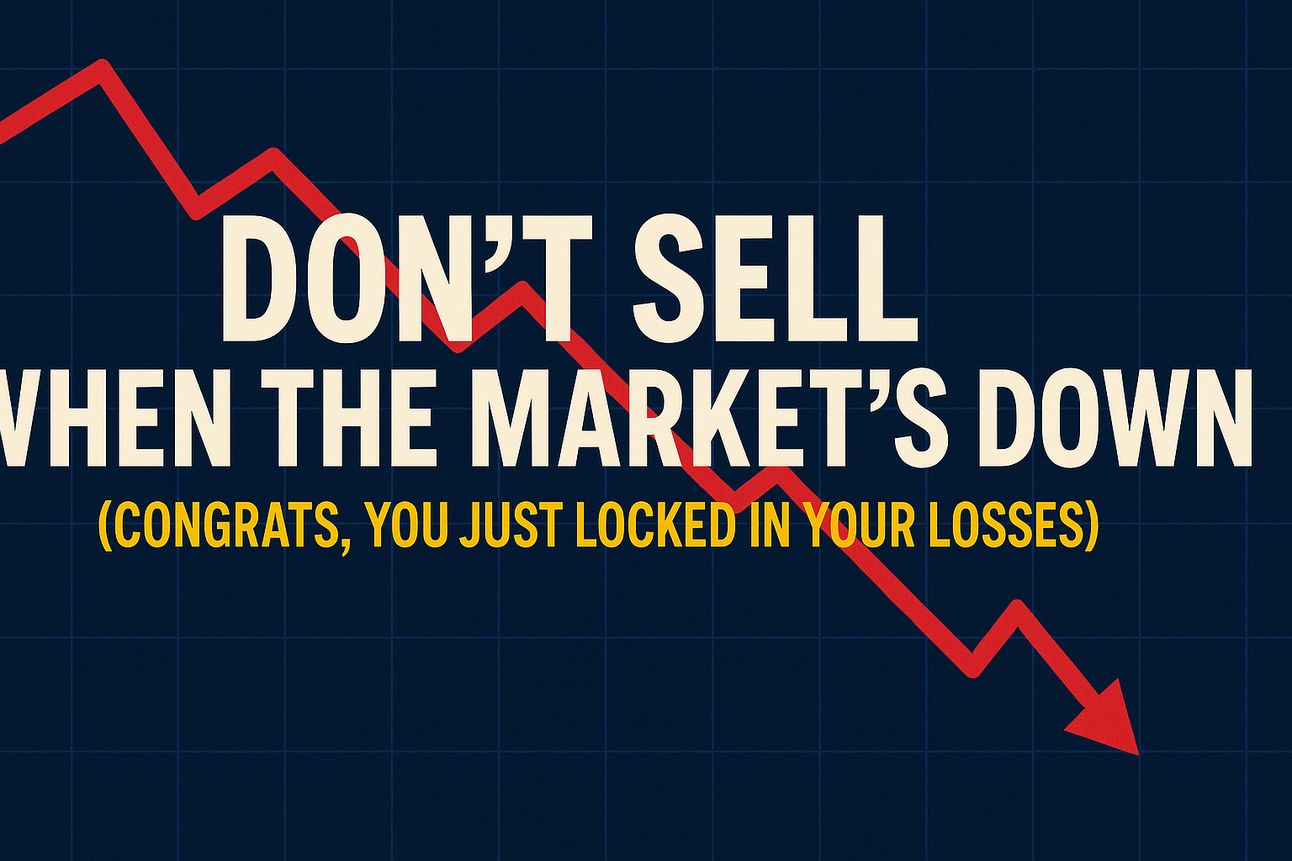- Luci Money Moves
- Posts
- “Don’t Sell When the Market’s Down”
“Don’t Sell When the Market’s Down”
(Unless You Enjoy Losing Money)

📉Market drops are scary, but panic-selling is where the real damage happens...
Here’s how to chill, hold, and win long-term—even when your portfolio looks like a horror movie.

Find What Your Looking For Here
🎬 Let’s Set the Scene
Your index fund is bleeding red. Your portfolio looks like it got ghosted.
Every headline is yelling RECESSION like it’s the season finale of financial Armageddon.
Your brain: “Should I sell now and protect what’s left??”
Reality: That’s like rage-quitting Mario Kart in 12th place before you get the Bullet Bill—and you miss the comeback.🛑 What You Don’t Want to Happen
Look—we get it. Loan dread is real. But pretending your loans don’t exist? Not a winning strategy…
📉 Don’t Sell the Dip—Here’s Why
Down != Out
Just because your portfolio looks like a disaster and is flashing red doesn’t mean you’ve lost money.
The painful drop? Just a paper loss—not a permanent one.
Selling during a downturn is like jumping off a rollercoaster halfway through the ride—scary in the moment, but it cuts you off from the recovery waiting on the other side.
And historically? That recovery tends to come faster than you think.
Take 2008. Take 2020. Markets fell fast—but then bounced back.
If you sold in the chaos (most likely at a loss), you probably missed the rebound.
⏳Why Staying Invested Beats Market Timing (Almost Always)
Trying to time the bottom? Congrats — you’re now a full-time fortune teller:
You wait for the market to go “just a bit higher” because you think you can squeeze just a little bit more money out…
Then it drops again, and you panic.
You sell — locking in losses and missing future gains.
And while you’re waiting for the “perfect time to re-enter,” the market moves on without you.
Like how life moves on — With or Without You.
According to Morgan Stanley, the best days in the market often happen right after the worst days.
Miss them?
Your returns take a hit — fast.
📊 Miss the 10 best days in the market over a decade? Your gains get slashed nearly in half.
Miss 20 best days? Forget about it — you’ve nearly flatlined performance.
(Morningstar and Thrivent Funds both back this up with decades of data.)
Even Forbes recently laid it out:
Timing the Market is nearly impossible — even for pros.
📉 Timing the Market Can Cost You More
You’re not just risking missing the rebound — you’re also adding:
Transaction Costs
Potential Tax Hits
The Mental Strain from second-guessing your every move.
AP News reported that panic-selling (aka the Portfolio Pants-Pooping Phenomenon) often leads to regret, as investors watch the market recover without them.
Even professional fund managers rarely get it right consistently.
So if the people paid millions to do this full-time struggle to time it perfectly — what makes the rest of us think we’ll beat the odds?
🚀 The Bottom Line
Selling in a panic turns temporary paper losses into permanent financial mistakes.
Market crashes are normal; rebounds are historically reliable
Timing the market costs more than it saves
And the biggest winners? They stay invested and zoom out.
🔭 Zoom Out—Literally
1-month chart? 🔻Panic.
10-year chart? 📈Growth.
🧊Chill. Markets trend up over time — if you let them.
If you’re in your 20s or 30s, time is your biggest asset. Let compounding do its thing.
Short-term dips are just noise.
The long-term trend? Up and to the right.
🎶 Trust the playlist—don’t skip the track just because you think the song is going to be bad given the first 20 seconds.
🏦 But What If You Need the Money Soon?
If you’re investing money you’ll need in the next few months…
That’s not investing. That’s gambling.
Instead, use money buckets:
Checking → for daily spending
Emergency Fund → 3–6 months of expenses in a HYSA (High-Yield Savings Account)
Savings (1–3 years) → HYSA (High-Yield Savings Account) or even individual bonds
Investments (5+ years) → Let it grow and ride the waves
💡 Investing works best when your money has time to recover from dips.
Match your money to your timeline—that’s the real strategy.
🙋So… When Should You Sell?
Not every sale is emotional. Sometimes it’s intentional.
Ask yourself:
💭 Is my portfolio aligned with how much risk I can stomach?
If every dip sends you spiraling, your investments might not match your true risk tolerance.
🎯 Try one of these free risk tolerance quizzes to find your comfort zone:
Your goal isn’t to be perfect or time the market — it’s to build a portfolio you can hold onto through the tough seasons.
🎯 Final Thoughts
🚨 Don’t sell just because it’s red. Stay invested. And maybe—just maybe—stop doom-scrolling your portfolio every five minutes. 🇺🇸 Happy Fourth of July, Folks! 🎆 Mitch |  Fourth of July Indeed |
💳 Using the wrong credit card? That's like panic-selling your rewards.
Find your perfect card in seconds → JoinLuci.com
(Students, travelers, cashback chasers - we've got you.)
📈 Want a money newsletter that explains investing and other personal finance topics?
Without the finance bro energy?
Join Luci Money Moves
Reply